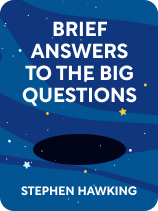

This article is an excerpt from the Shortform book guide to "Brief Answers to the Big Questions" by Stephen Hawking. Shortform has the world's best summaries and analyses of books you should be reading.
Like this article? Sign up for a free trial here .
How did humans come into existence on Earth? Why do monotheistic religions challenge Stephen Hawking’s evolution theory?
In his book Brief Answers to the Big Questions, Stephen Hawking gives a brief overview of how humans got here. He begins his timeline in the present day and goes back to the singularity that created time.
Here’s Stephen Hawking’s evolution timeline—and why many religions disagree with him.
Science’s Explanation of Our Origins
What does science say about how the world works and where it came from? Hawking does not attempt to provide a comprehensive explanation of the laws of nature, but he does give a brief overview of how we got here. According to Stephen Hawking, evolution and science traces our origins back to the beginning as follows:
1. Humankind developed from earlier life forms, as described in the theory of Darwinian evolution (which postulates that species change over time as random mutations alter the genetic code of different individuals, and the strongest individuals are more likely to pass on their genes).
2. The first life forms appeared in Earth’s oceans about 3.5 billion years ago. Scientists don’t know exactly how the first living things formed from non-living molecules. As yet, they have not even been able to synthesize DNA from inorganic substances. Nevertheless, Hawking infers that the probability of life forming in a suitable environment is probably relatively high because, in cosmic terms, life appeared on earth quite quickly—only half a billion years after the earth’s surface cooled enough to accommodate liquid water.
3. Earth, the sun, and the rest of our solar system were formed when clouds of interstellar gas from the supernova explosions of earlier stars collapsed under the influence of gravity. This is important because carbon and other elements that are necessary for life had to be synthesized by nuclear fusion in earlier generations of stars.
4. Earlier stars were formed from clouds of hydrogen and helium.
5. These clouds of matter came from the big bang. The big bang was the moment the universe came into being at a “singularity,” where all matter, energy, space, and time were initially concentrated in an infinitesimally small area. The universe expanded outward from this original singularity. (Shortform note: Hawking discusses the big bang model in more detail in A Brief History of Time.)
6. But what caused the original singularity? Hawking says it didn’t need a cause because time itself began at the singularity. The theory of general relativity predicts that time slows down in regions of high gravity. At a singularity, gravity is infinitely strong because of the infinite density of matter at that point, so time stops entirely. And time is what delineates cause and effect, because causes must come before their effects. Time starts at the big bang singularity, so nothing can happen before it, and thus it can’t have a cause.
| Is Science’s Answer Better Than Religion’s Answer? Followers of some religions (particularly monotheistic religions) tend to challenge Hawking’s assertion that science provides better answers to the question of where we came from. To illustrate how some religions still claim to offer more complete answers, let’s contrast Hawking’s chronology with that presented by Christian astrophysicist Hugh Ross: Ross disputes Hawking’s first two points above and instead believes that God created life on earth. He asserts that God created Adam and Eve as the first humans. For that matter, God created every individual species of lifeform. Scientific studies of the fossil record reveal numerous species appearing and disappearing over Earth’s geologic history, but scientists have never observed one species change into another, either directly or through fossil evidence. Ross argues that these observations fit better with the idea that God created new and unique animal species at each stage of Earth’s geologic history than it does with the idea that earlier species changed into other species over time. Ross goes on to assert that there are many scientific problems with the theory of Darwinian evolution, such as its inability to explain the irreducible complexity of cells. Atheistic models offer no mechanism for the origin of the first life forms. But if the mechanism was divine intervention, then it’s no wonder scientists haven’t been able to find a naturalistic mechanism, and irreducible complexity is not a problem for God. Ross also disputes Hawking’s theories of how planetary bodies formed as outlined in points three and four above, instead believing that God orchestrated Earth’s formation. Strictly speaking, Ross agrees with Hawking’s view of how our solar system physically formed from gaseous remnants of earlier supernovae. However, Ross also argues that the earth and solar system are too exquisitely fine-tuned for human life to be the product of mere chance. There are so many astronomical parameters (such as planet size and chemical composition, star brightness, orbital stability, and so on) that must be in a certain range for a planet to be habitable that the odds of getting even one human-habitable planet in the entire universe by random chance are infinitesimally small. Ross takes this as evidence that God personally fine-tuned Earth’s formation, even if he worked behind the scenes through the laws of physics. Finally, Ross weighs in on Hawking’s theories of the origins of the universe, believing that God created the big bang singularity. He endorses an inflationary big bang model similar to Hawking’s. But where Hawking argues that the singularity precludes the universe having a cause, Ross argues the opposite: Since time itself began at the big bang singularity, the singularity had to be created by something (or someone) that is not confined to the space-time of our universe. In other words, since the singularity precludes a natural cause, the universe had to have a supernatural cause. Is Ross’s model better than Hawking’s? It depends on your perspective. Ross asserts that his creationistic model matches current scientific observations better than atheistic models do. But Hawking points out that, historically, people have often appealed to the supernatural to explain natural phenomena that they didn’t understand. He concedes that scientists don’t yet have naturalistic explanations for some things, like the origin of the first life forms. Nevertheless, he expects natural mechanisms to be discovered, based on the historical trend of natural explanations replacing supernatural ones. Ross might argue that this goes against the scientific method: A scientist should accept the simplest model that matches current observations, and update his model as new data becomes available, rather than appealing to possible discoveries that haven’t been made yet. Ross concedes that a scientist should test every model by using it to predict future observations, and then comparing the predictions to the new observations. Nevertheless, he argues that scientists’ ongoing failure to identify a naturalistic mechanism for the origin of life contradicts Hawking’s predictions and agrees with the predictions of his creationistic model. Perhaps future discoveries will eventually vindicate either an atheistic model or a theistic one, but for now the controversy continues. |

———End of Preview———
Like what you just read? Read the rest of the world's best book summary and analysis of Stephen Hawking's "Brief Answers to the Big Questions" at Shortform .
Here's what you'll find in our full Brief Answers to the Big Questions summary :
- The final lessons from Stephen Hawking, published after he passed
- Hawking's thoughts about God and religion
- Why humans should be colonizing the Moon






